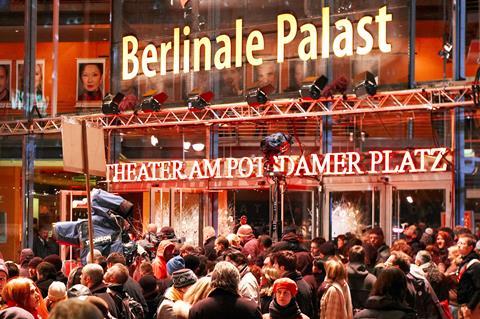
A group of contractors working at this year’s Berlinale have criticised the festival’s lack of response to the ongoing conflict in Gaza and called for “an immediate ceasefire”.
The open letter was published on Instagram last night (February 12) by an account called ‘Berlinale Workers Voice’ in response to a statement by festival co-heads Mariette Rissenbeek and Carlo Chatrian about the conflict.
The original festival statement said: “Our sympathy goes out to all the victims of the humanitarian crises in the Middle East and elsewhere… We want everyone’s suffering to be recognised and for our programme to be open to discussing different perspectives on the complexity of the world.”
The open letter, signed by around 30 contractors responded: “We are painfully aware of the unbearable dynamics of institutional inertia in the cultural sector in Germany, and we recognise the current limits imposed on speech. We want to hold the festival and ourselves to a higher standard. An international platform such as the Berlinale and we, in our roles as programmers, consultants, moderators, facilitators, and space holders, alongside further Berlinale workers, can and should voice dissent at the current assault on Palestinian life.
“We join a global solidarity movement to demand an immediate ceasefire and call for the release of all hostages.”
It added: “While we acknowledge isolated and minor attempts to create space for exchange, we would expect the programme of this year’s festival to engage more actively and discursively with the urgency and reality of the moment by holding dialogue spaces of its own initiative and design in the big houses we call cinemas. Instead, we witness no initiatives that invite professionals and/or audiences into a dedicated space of discussion structured in a way that allows for a lengthy encounter between everyone.”
The letter said that “stronger institutional stances” were needed in response “to an inconceivable loss of civilian life in Gaza”. It continued: “We expect the festival to take a stance that is consistent with those taken in response to other events that have struck the international community in recent years.”
The festival is offering an initiative called TinyHouse this year, a meeting place where visitors can have “an open dialogue about the war in Israel and Gaza”.
It is the latest political issue to face organisers ahead of this year’s festival, which is set to begin on Thursday (February 15). Last week, the Berlinale was criticised by industry professionals for inviting representatives from Germany’s far-right Alternative fur Deutschland (AfD) party to the festival’s opening ceremony. The festival subsequently withdrew the invitations.
The fall out from the Israel/Hamas conflict has been spilling over into film festivals since the attacks on October 7. In November, the International Film Festival Amsterdam (IDFA) had to issue three separate statements in response to an incident on its opening night, when a pro-Palestine protestor took to the stage.
Screen has contacted the festival for comment.
The letter is in full below:
A statement from Berlinale workers
As Berlinale contractors, who admire the festival’s vocal, principled track record defending humanitarian values, we feel the need to offer a position that builds on the festival’s statement concerning the current humanitarian crisis in Gaza (19 January 2024).
We are painfully aware of the unbearable dynamics of institutional inertia in the cultural sector in Germany, and we recognise the current limits imposed on speech. We want to hold the festival and ourselves to a higher standard. An international platform such as the Berlinale and we, in our roles as programmers, consultants, moderators, facilitators, and space holders, alongside further Berlinale workers, can and should voice dissent at the current assault on Palestinian life.
We join a global solidarity movement to demand an immediate ceasefire and call for the release of all hostages.
Against an ongoing crisis that “appears to be capable of falling within the provisions of the [Genocide] Convention” (quote from the International Court of Justice’s judges), some of us – the undersigned – continue to contribute with our labour at this year’s festival due to our belief in its primary role and significance as an international cultural space, one that has a responsibility to not only raise awareness and foster debate but also amplify the global and pluralistic demands to end oppression, occupation, forced displacement and violence.
In short, call for peace and liberation. This responsibility is aligned with the festival’s past commitments and principles, stances which have earned the Berlinale a uniquely respected position within the cultural landscape. While we acknowledge isolated and minor attempts to create space for exchange, we would expect the programme of this year’s festival to engage more actively and discursively with the urgency and reality of the moment by holding dialogue spaces of its own initiative and design in the big houses we call cinemas.
Instead, we witness no initiatives that invite professionals and/or audiences into a dedicated space of discussion structured in a way that allows for a lengthy encounter between everyone.
As the world bears witness to an inconceivable loss of civilian life in Gaza – including those of journalists, artists, and film workers – as well as the destruction of unique cultural heritage, we need stronger institutional stances. We expect the festival to take a stance that is consistent with those taken in response to other events that have struck the international community in recent years.
Many members of the German and the international film community who have continuously believed in and contributed to the Berlinale’s profile of excellence expect it to both firmly support and actively contribute to a more just world. Of course, the Berlinale is not an exception and these expectations extend to the broader worlds of film and culture internationally, whose responses to the ongoing war of aggression have been largely defined by silence and neutrality.
Grounded in an intersectional and anti-discrimination perspective, we stand with everyone taking steps to resist the rise of far-right nationalist movements worldwide and all forms of discrimination including anti-Semitism and Islamophobia. We claim the 74. Berlinale to be a place of key importance to speak truth to power and are hoping to navigate this edition in contributing to an atmosphere of exchange, encounter and generosity.























No comments yet